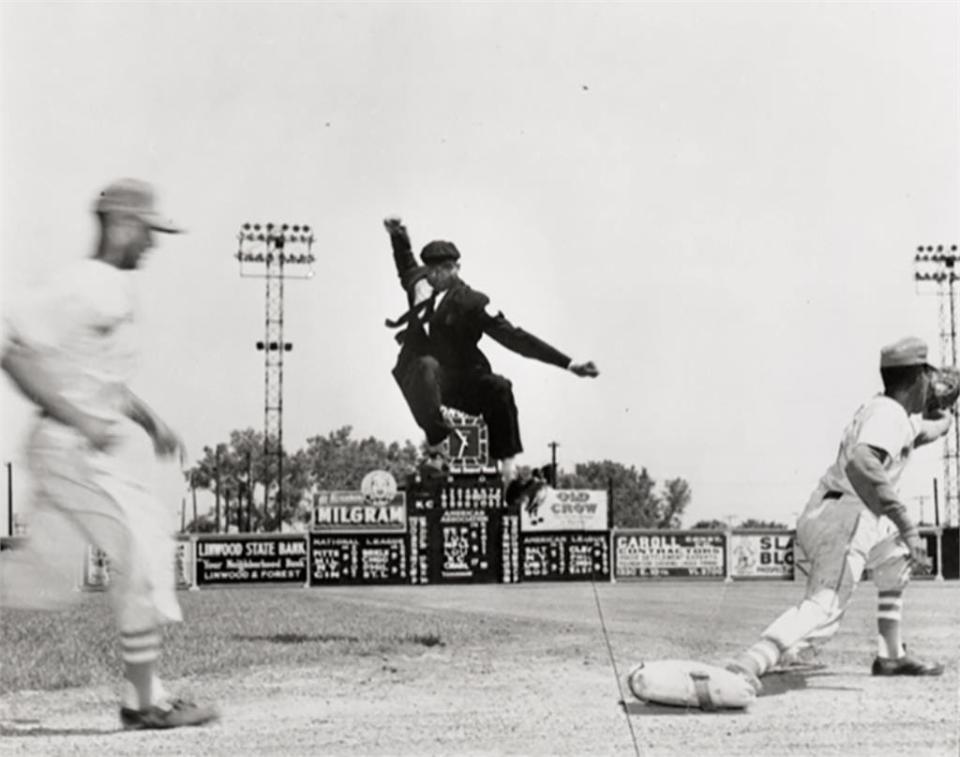Documentary conjures beauty, forgotten figures of Negro League baseball
- Oops!Something went wrong.Please try again later.
- Oops!Something went wrong.Please try again later.
- Oops!Something went wrong.Please try again later.
- Oops!Something went wrong.Please try again later.
A celebration of Black excellence both on and off the diamond, director Sam Pollard’s new documentary “The League” portrays Negro League Baseball as not only a feat of entrepreneurial ingenuity but also something profoundly poetic.
By showing vintage footage of Black players with unmatched grace, speed, and improvisational skills smartly paired with a jazzy score, Pollard argues that Black baseball of this time was an art form as well as a reflection of Black resilience and ambition which existed despite the many systemic obstacles at the turn of the 20th-century.

In sharp contrast to the leisurely home run trot of the not-so-sleek Babe Ruth, clips of Negro Leaguers stealing bases, stretching singles into doubles, and making incredible plays with stylish nonchalance present their gameplay as grittier and faster-paced than that of their white counterparts. Theirs was a fun and exuberant game, full of the innocent joy that baseball legend Hank Aaron describes in the film’s opening where he recalls playing backyard ball as a youth with a bat made from a broom handle.
Similar to Pollard’s previous documentaries “MLK/FBI” and “Mr. Soul,” this film animates the past and excavates Black history that has been either ignored or painfully underappreciated. Weaving together interviews of players, umpires, historians, and cultural critics, Pollard explores many rich narrative strands, mixing accounts of Black superstars like Satchel Paige and Josh Gibson with that of visionary Black owners like Rube Foster, Effa Manley, and Cumberland Posey who helped to create and sustain “The League.”
Foster, a ballplayer himself who was purported to have taught Hall-of-Fame Pitcher Christy Mathewson how to throw the notoriously hard-to-hit “screwball,” is a compelling figure who is credited with organizing the first Negro National Leagues by encouraging regional teams to cooperate with one another and recruiting players from Black colleges across the country.
Co-owner of the Newark Eagles with her husband Abe, Effa Manley is described as “The First Lady of Black Baseball” and a woman ahead of her time as she used business savvy and clever promotional tactics to build a team that would rival Posey’s perennially talented squad, the Homestead Grays.
At the same time as the accomplishments of these figures are brought to light, other legacies are complicated by the film’s treatment. Branch Rickey, for instance, the oft-praised Dodger General Manager best known for signing Jackie Robinson and helping to break the MLB’s “Color Barrier,” is sharply criticized for his dismissive attitude towards the Negro Leagues and his refusal to buy out the rest of Robinson’s contract with the Kansas City Monarchs.
Still, perhaps the most powerful aspect of this film is the way it challenges linear notions of racial progress in America. By pointing out how Black players were on white teams years before Jackie Robinson and describing the intensified racial riots and lynchings of Black Americans post World War I, the film depicts an ebb and flow to social justice that contradicts the simplified narratives that are often told.
Even integrating Major League Baseball was, according to Bob Kendrick, President of the Negro Leagues Baseball Museum, “…good morally, it was good socially, and it moved us in ways in which we never, ever dreamed possible, but that progress came at a cost.” A large part of that cost was the dissolution of the Negro Leagues which were no longer financially viable after many of its players and fans had moved on to the integrated Major Leagues.
While this adds a somber note to the film’s ending, it is not enough to undermine the love and pride for the Negro Leagues that resonates in almost frame.
Whether you are a baseball buff, a student of Black history, or merely a casual viewer, “The League” will offer you an experience that is as poignant as it is entertaining, while chronicling how the Black community made America’s pastime all the richer.
Entertainment: Looking for fun events? Top 5 things to do around Tallahassee this weekend
If you go
What: “The League” presented by the Tallahassee Film Society
When: 7 p.m. Friday, 2 p.m. Sunday, and 7 p.m. on Friday, July 21
Where: All Saints Cinema, 918-½ Railroad Ave.
Cost: $11 general admission, $9 for TFS members and students
Visit: tallahasseefilms.com
Anthony Borruso is a Ph.D. candidate in the Department of English at Florida State University and the Poetry Editor for Southeast Review.
This article originally appeared on Tallahassee Democrat: Documentary conjures beauty, forgotten figures of Negro League baseball

